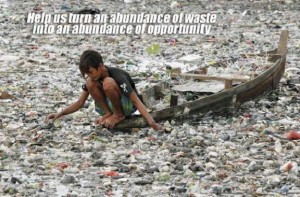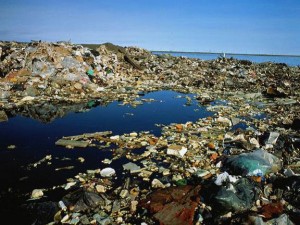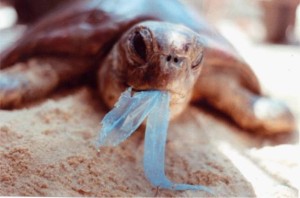An amazing initiative by The Plastic Bank is setting up plastic re-purposing centres around the world in places where waste plastic and poverty abound. The project seeks to empower people to harvest plastics as a currency they can exchange for tools, household items, parts and 3D printing. Their pertinent, vital mission is to remove the endless plastic waste created by humans from the land, oceans and waterways while helping people ascend from poverty and transition into entrepreneurship.
The Plastic Bank seeks to empowers the worlds disadvantaged to collect and trade plastic waste as a currency. The plastic bank solves poverty by revealing the value in Ocean Bound Plastic waste.

Back when I was just 10 years old I wrote and published an magazine called ‘Did You Know’ about ecological issues. The profits from selling the magazine at school (for 10p an issue) all went to Friends Of The Earth. In return they gave me a hectare of rainforest… the paperwork for which I have long since lost! A few decades later I find myself writing about exactly the same problems, in a world that appears to be on a similar trajectory as when I was a child. Hence, in part, my cynicism about current human economic systems.

Polymers outside of the confines of the Earth are far rarer than metals. This is an extremely important point until mankind can, potentially, successfully synthesis artificial polymers on a widespread scale. The potential pending race to the moon for resources by P.R.China, the Russian Federation (an her Eurasian Union partner Kazakhstan with it’s myriad astronautic facilitates), E.U., U.S.A. and India for resources will yield no polymers — no compressed archaic lifeforms reside in the geology of Luna.
Our hydrocarbon-based plastics are likely to only be derived from Earth for some time.
3D printing already provides an interesting alternative to polymers derived from oil in the form of Polylactic Acid (PLA), a plastic derived from starches in crops such as maize. Even PLA however is contingent upon there being crops available for production. As mankind finds it impossible to keep its pants up, we endlessly multiplying humans are now also beginning to strain the potential of food production. Like lemmings, our blind-spot in awareness of that which is required to maintain a balance with our ecology is now placing vast strain upon our environment.

Ecological activism is only going to get much more intense. Only this week a gigantic 1.5-tonne, 17-metre long wind turbine was dropped off by eco-protesters at a new gas fracking site at Manchester, England. Greenpeace have hit headlines as Russian authorities mounted a military attack upon peaceful protesters being very naughty by attempting to scale an oil platform in the Arctic. China has seen many thousands engage in ecological protests in recent years, including taking over local government offices. This strength of feeling that could be channelled into widespread affirmative innovation. Innovations such as The Plastic Bank.
The Plastic Bank has a mission statement to create and lead a movement for ‘Social Plastic’ towards worldwide demand for the use of Social Plastic in everyday products. The higher the worldwide demand becomes, the higher the reward will be for harvesting Social Plastic. This is achieved through ‘Plastic Banks’ established strategically in impoverished areas with an existing abundance of plastic waste. The Plastic Bank will offer people both education and the opportunity to trade re-usable plastics for credits that can be used for the printing of 3D products, re-purposed necessities and/or micro-finance loans.
The project is led by David Katz, who has also founded Nero Global Tracking and The Core Values Institute. Katz has consulted globally with 100′s of businesses about the use and implementation of values-based leadership, Business Process, Mobile Workforce Management and Social Responsibility.
The Plastic Bank ran a fundraising to turn their vision of social plastic into a reality this year and raised over USD$20,000 from supporters. The Plastic Bank is currently the world’s only organisation to monetise mixed plastic waste.
Please follow these links for further articles regarding 3D printing and upcycling, recycling, ecology and poverty.


